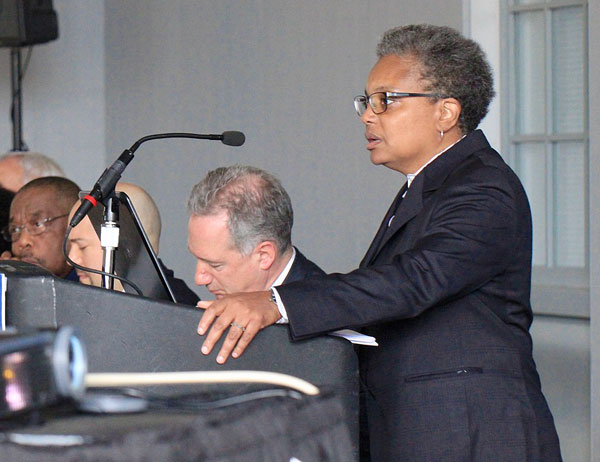
May 20, 2019; WGN-TV and Washington Post
“Putting Chicago government and integrity in the same sentence is …well…a little strange,” acknowledged Lori Lightfoot, Chicago’s newly sworn-in mayor, in her inaugural address. “But that’s going to change. It’s got to change. For years, they’ve said Chicago ain’t ready for reform. Well, get ready, because reform is here.”
Lightfoot will have her work cut out for her. That said, she enters office with enormous political capital. Lightfoot, the first Black woman and openly gay activist to become the city’s mayor, won her seat in a landslide runoff election against Cook County President Toni Preckwinkle, carrying all 50 of the city’s wards and an overwhelming 73 percent of the vote citywide. Jesús “Chuy” García, who had surprised Chicago’s political establishment by forcing former Mayor Rahm Emmanuel into a runoff election four years ago and who is now a local congressional representative, told Mark Guarino in the Washington Post that “the fact she won all 50 wards, in a city that has been historically polarizing, is transformative for this city. People want change.”
It also helps that 12 of the 50 city council members are new and thus less wedded to old prerogatives. One of Lightfoot’s first actions in office was to end what is called in Chicago aldermanic privilege, which has given council members veto power over zoning and permits in their district, creating an incentive for local corruption.
In taking office, Lightfoot has been intentional; while, like most inaugural addresses, her speech was full of pleasantries, it also offered unusual specificity. Using Chicago’s four-star flag as a framing device, Lightfoot pledged to focus her administration in four areas. Integrity, mentioned above, was one of them. The other three were public safety, schools, and stability.
With regard to safety, Lightfoot said that “public safety must not be a commodity that is only available to the wealthy.” To achieve this, Lightfoot pledged to take a community-oriented approach. “This is not a challenge that can be solved by law enforcement alone, nor will we ever place the blame on people in communities who are under siege.”
Lightfoot added that city policy on public safety must include support for returning citizens and the development of “a trauma-informed city starting with repairing our broken mental health safety net.” Speaking to CBS News the day afterward, Lightfoot noted, “We have been embarked on what I would call a proactive strategy that looks at our gun violence as a public health crisis, which is what it is. That means we look at the root causes of the violence. That means we invest in neighborhoods, we re-stitch together our broken…social safety net.”
With respect to education, Lightfoot pledged to “put equity first in our education system; when we make good on a promise that every kid matters, it will instill within our children the values we seek to foster in our city as a whole.” Two days after taking office, Lightfoot announced she will replace the city’s entire school board before the end of June.
Sign up for our free newsletters
Subscribe to NPQ's newsletters to have our top stories delivered directly to your inbox.
By signing up, you agree to our privacy policy and terms of use, and to receive messages from NPQ and our partners.
Stability may be the most complicated of Lightfoot’s four goals. On the one hand, it refers to the need to, as Lightfoot puts it, change city finances away from one where, in part due to pension obligations, too much “money is being sent to banks and Wall Street bond firms instead of going to our rebuild our neighborhoods, reduce our property taxes and revitalize our transportation system.” But Lightfoot emphasized that to her stability also referred to stable affordable housing, stable local businesses, and stable neighborhoods, “which means paying as much attention to our neighborhood businesses as we do to the businesses downtown.”
Lastly, Lightfoot called on the city to “establish a new Social Compact” that creates a more caring city. As Lightfoot put it,
Today, too many of our people lack decent housing, and far too many end up on our streets.
Today, too many of our people feel isolated and alone. And as our senior population increases, we must meet the needs of those without family or friends for support.
Today, as we prepare to enter the third decade of the twenty-first century…one out of every five children in Chicago still lives in poverty.
Addressing the problems of housing, isolation, and poverty in our great city is just as important as anything else we may do—and far harder to solve.
But tackle these problems we must.
Last week, Lightfoot also released a 116-page transition plan, developed through a set of committees in which 400 Chicagoans participated, that lays out her agenda in greater detail. In her speech, Lightfoot pledged to forge “a new era of trust between the people of Chicago and the government that serves them.” Time will tell if this vision is realized.—Steve Dubb













